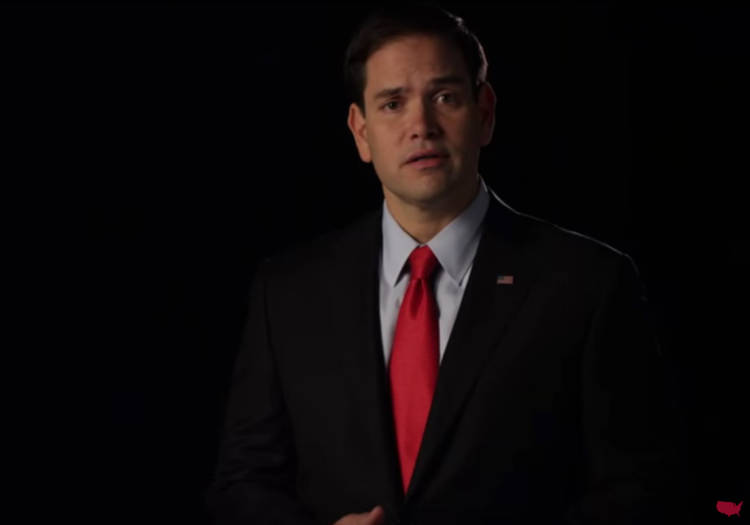The more you pay attention to Marco Rubio, the third-place frontrunner for the 2016 GOP presidential nomination, the more you begin to understand just how slippery he is as a politician. His contortions and backflips on immigration policy – going from a vocal supporter of comprehensive reform to a standard-issue “border security first” Republican – are well-documented. But in the last week Rubio has obscured his positions on three other issue areas, leaving the casual observer unsure as to where he stands, but giving them enough information to make them feel he generally agrees with them.
Refugees
Way back in September, when the Syrian migrant crisis was dominating news in Europe and the United States, Rubio came out in favor of accepting Syrian refugees into the United States. Not only did he support it, he cast it as a fundamentally American thing to do. “We’ve always been a country that has been willing to accept people who have been displaced,” he said at the time, “and I would be open to that if it can be done in a way that allows us to ensure that among them are not people who are part of a terrorist organization who are using this crisis.”
After the Paris terrorist attacks, though, Rubio joined the rest of the GOP in favoring a clampdown on refugees for the foreseeable future. At least, he seems to have – no one is really quite sure what Rubio wants. His first reaction post-Paris was to say we can’t take any refugees because we can’t effectively vet anyone. “It’s not that we don’t want to, it’s that we can’t,” he said. “Because there’s no way to background check someone that’s coming from Syria.” Then he switched up to say that certain types of Syrians – 5-year-old orphans, 90-year-old widows, and priests – should be allowed refugee status based on “common sense.” But then he announced his support for the House bill to allow refugees to enter if they pass the allegedly impossible-to-conduct background check and are certified as acceptable by the heads of various national security departments. Every time he opens his mouth he seems to have a new position.
Abortion
The first Republican presidential debate of the nominating season featured a testy exchange between Rubio and Fox News’ Megyn Kelly, who said that Rubio favors “a rape and incest exception to abortion bans” and asked how he could square his belief that life begins at conception with his support for these exceptions. Rubio rejected the notion that he favored these exceptions – “I have never said that. And I have never advocated that” – and said that his position was to protect all life at all times. “What I have advocated is that we pass a law in this country that says all human life at every stage of its development is worthy of protection,” he said. “And I think future generations will look back at this history of our country and call us barbarians for murdering millions of babies who we never gave them a chance to live.”
The message he sent was clear: hardline opposition to abortion that is even more extreme than the Republican presidential nominees of past election cycles. But since then he’s moved conspicuously to obscure his true beliefs and adopt a slightly more reasonable façade. “I, as president, will sign a bill that has exceptions” for rape and incest, he told the Associated Press this week. “I do not personally require a bill to have exceptions – other than life of the mother – in order for me to support it.” So Rubio doesn’t support those exceptions, except in cases of supporting those exceptions.
Gay Marriage
While Rubio’s trying to take the edge off his opposition to abortion rights, he’s also moving to sharpen his resistance to marriage rights for gay couples. When the Supreme Court’s decision in Obergefell v. Hodges made same-sex marriage legal nationwide, Rubio noticeably avoided throwing in with candidates like Ben Carson and Mike Huckabee, who denounced the ruling and questioned the legitimacy of the Court. “While I disagree with this decision, we live in a republic and must abide by the law,” Rubio said in a statement. While other candidates were rallying around Kentucky clerk Kim Davis for refusing to issue marriage licenses in protest of the ruling, Rubio said: “While the clerk’s office has a governmental duty to carry out the law, there should be a way to protect the religious freedom and conscience rights of individuals working in the office.”
Again, the message was clear: he disagrees with the ruling, but the law is the law. But this week, during an interview with the Christian Broadcast Network, Rubio discussed the Court decision and its legitimacy and struck a very different tone. “If you look at biblical lessons, the first thing is we are clearly called, in the Bible, to adhere to our civil authorities,” he said. “But that conflicts with also the requirement to adhere to God’s rule. And so when those two come in conflict, God’s rules always win.”
As it pertains to abortion and gay marriage, it seems clear that Rubio is purposefully trying to leave people confused as to what he really believes. A hardcore conservative can find Rubio statements on those issues that will align with their thinking, while more moderate voters can also be assured that Rubio appears more reasonable and not ideologically rigid in the way that Ted Cruz is. On refugees, Rubio comes off as more lost than calculating, but the effect is largely the same. He wants people to project their own beliefs onto him and leave everyone unsure as to what his true position is.

